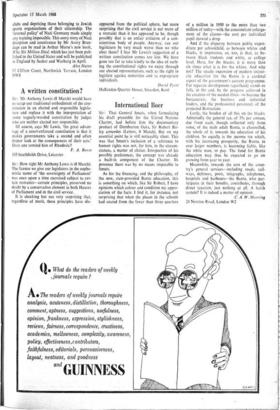International Boer
Sir: That General Smuts, when formulating his draft preamble for the United Nations Charter, had before him the documentary product of Dumbarton Oaks, Sir Robert Bir- ley concedes (Letters, 8 March). But on my essential point he is still noticeably silent. This was that Smuts's inclusion of a reference to human rights was not, for him, in the circum- stances, a matter of choice. Irrespective of his possible preferences, the concept was already a built-in component of the Charter. Its presence there was by no means imputable to Smuts.
As for the financing, and the philosophy, of the new, state-provided Bantu education, this is something on which, like Sir Robert, I have opinions which colour and condition my appre- ciation of the facts. I find it, for instance, not surprising that when the places in the schools had soared from the fewer than three quarters
of a million in 1950 to the more than two million of today—with the concomitant enlarge- ment of the classes—the cost per individual pupil showed a drop.
And if the disparity between public expen- diture per schoolchild, as between whites and blacks, is impressive, so, too, is that, as be- tween black students and white, at college level. Here, for the blacks, it is more than six times what it is for the whites. And why not? The steady expansion of modern univer- sity education for the Bantu is a cardinal aspect of the government's current programme. For separate development (apartheid) stands or falls, in the end, by the progress achieved in the creation of the needed elites—to become the bureaucrats, the business and industrial leaders, and the professional personnel,. of the projected Bantustans.
Lastly, the burden . of all this on the 'blacks. Admittedly the general tax, of 35s per annum, due from each, though collected only from some, of the male adult Bantu, is channelled, the whole of it, towards the education• of his children. So equally is the income tax which, with his increasing prosperity, the. Bantu, in ever larger numbers, is becoming liable, like the white man, to pay. The fund for Bantu education may thus be expected to go on growing from year to year.
Meanwhile, towards the cost of the coun- try's general services—including roads, rail- ways, defences, posts, telegraphs, telephones, hospitals and harbours—the Bantu, who par- ticipates in their benefits, contributes, through direct taxation, just nothing at all. A harsh system? It is indeed a matter of opinion.










































 Previous page
Previous page